Common Leather Care Mistakes You Must Avoid can result in serious and irreversible damage to your high-quality shoes. One of the most frequent issues arises from the use of waterproofing sprays on smooth leather. While these sprays may seem like an easy fix for protecting your footwear, they can prevent essential nutrients from penetrating the leather, leading to dryness and cracks over time. Smooth leather is naturally water-resistant due to its grain layer, and it thrives on regular nourishment through shoe creams and waxes to maintain its durability. Rather than relying on sprays, choose premium leather conditioners and wax polishes that protect and nourish your leather, ensuring its longevity and preserving its natural qualities.
Essential Strategies for Effective Leather Protection
Understanding how to care for your leather goods is crucial for their longevity. Full grain leather is equipped with natural water-resistant properties thanks to its tightly woven fiber structure. However, these inherent qualities require consistent maintenance to remain effective. The lifespan and durability of your leather depend significantly on how well it is cared for. Using waterproofing sprays can impede the leather’s ability to breathe, which can lead to severe damage over time if not managed correctly. Regular maintenance practices are essential to keep your leather items in pristine condition.
Uncovering the Unique Benefits of Full Grain Leather
After undergoing the tanning process, full grain leather retains its original surface layer, which provides outstanding natural protection. Products made from this material maintain an intact grain layer that offers resistance against water and wear. This top layer is abundant in natural oils and fibers, forming a protective barrier that makes additional waterproofing sprays unnecessary and potentially harmful to the leather’s health. Embracing the characteristics of full grain leather ensures that your items remain resilient and beautiful.
Enhancing Leather’s Natural Moisture Regulation and Aging Process
Grain leather needs to effectively absorb and expel moisture to maintain its quality. The pores within the leather facilitate its ability to breathe and regulate moisture, keeping it pliable and preventing unsightly cracks. However, when waterproofing sprays are applied, they can seal these pores, blocking essential airflow and disrupting the natural moisture balance. Additionally, as leather ages, it requires appropriate nourishment through conditioning products. When waterproofing sprays are used, they create a barrier that prevents vital conditioning oils from penetrating the leather, leading to dryness and brittleness over time. Regular application of leather cream enables your leather to age gracefully, developing a rich and appealing patina.
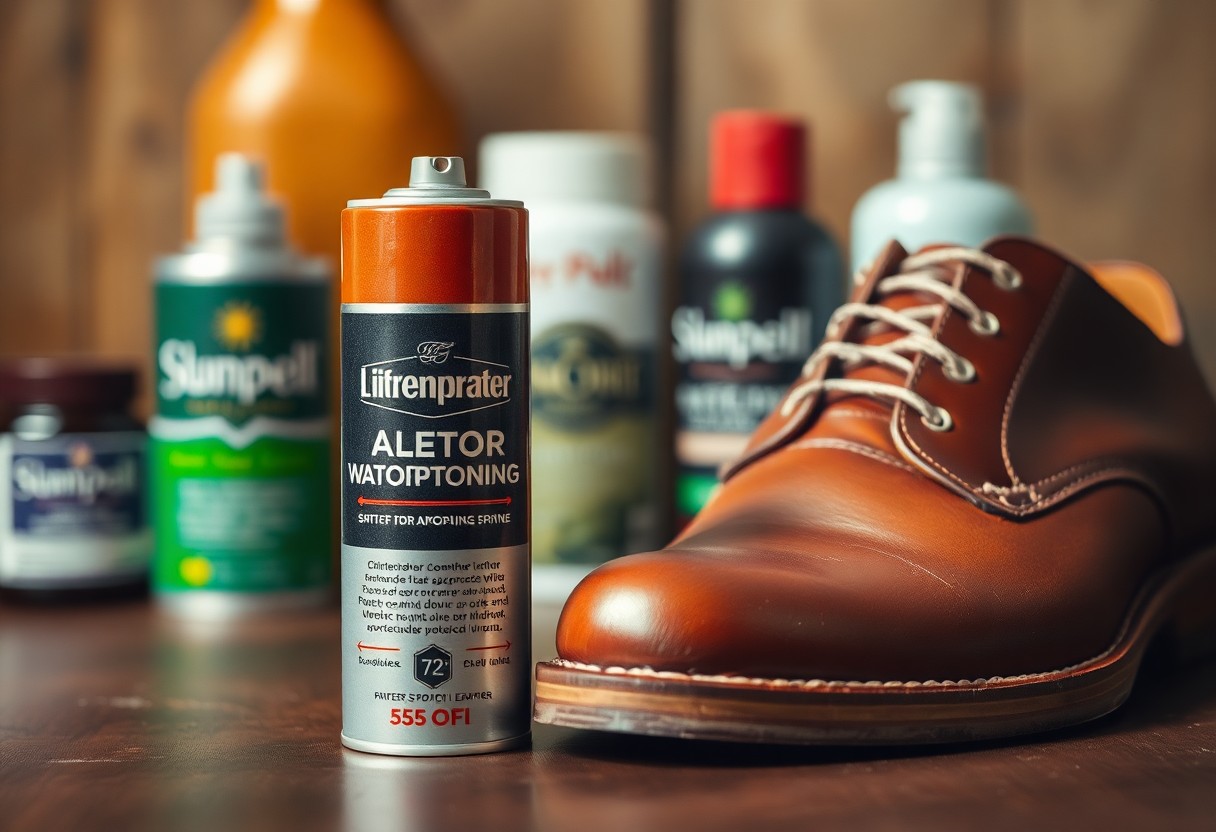
Recognizing the Risks of Using Waterproofing Spray
Many people mistakenly believe that waterproofing spray is the ultimate defense for their leather shoes, but this common practice can result in serious damage to your footwear. While these sprays do provide an immediate protective barrier against water, they simultaneously block essential nutrients from reaching the leather, setting the stage for potential long-term deterioration.
Dispelling Misleading Marketing Myths About Leather Care
Influenced by aggressive marketing strategies and well-intentioned advice from shoe store personnel, you may have been led to believe that waterproofing spray is necessary for all types of leather shoes. This misconception has been perpetuated by numerous shoe retailers, primarily due to the high profit margins and frequent repurchase rates associated with these products. In reality, regular smooth leather possesses innate protective qualities that do not require additional spray-on barriers for effective safeguarding.
Weighing Immediate Benefits Against Long-term Drawbacks
The damage to your leather shoes begins when waterproofing sprays create a barrier that blocks essential oils and conditioning agents from saturating the leather. While you might initially perceive improved water resistance, the truth is that your leather gradually becomes dry and brittle without the vital nourishment it requires. The consequences of using waterproofing sprays on smooth leather extend beyond superficial protection. Your leather needs regular nourishment to maintain its flexibility and durability. When shoe creams and conditioners cannot penetrate the leather due to the spray barrier, the material becomes susceptible to cracking and deterioration, significantly shortening your shoes’ lifespan. Natural waxes and appropriate conditioning products offer superior long-term protection while promoting the leather’s health.
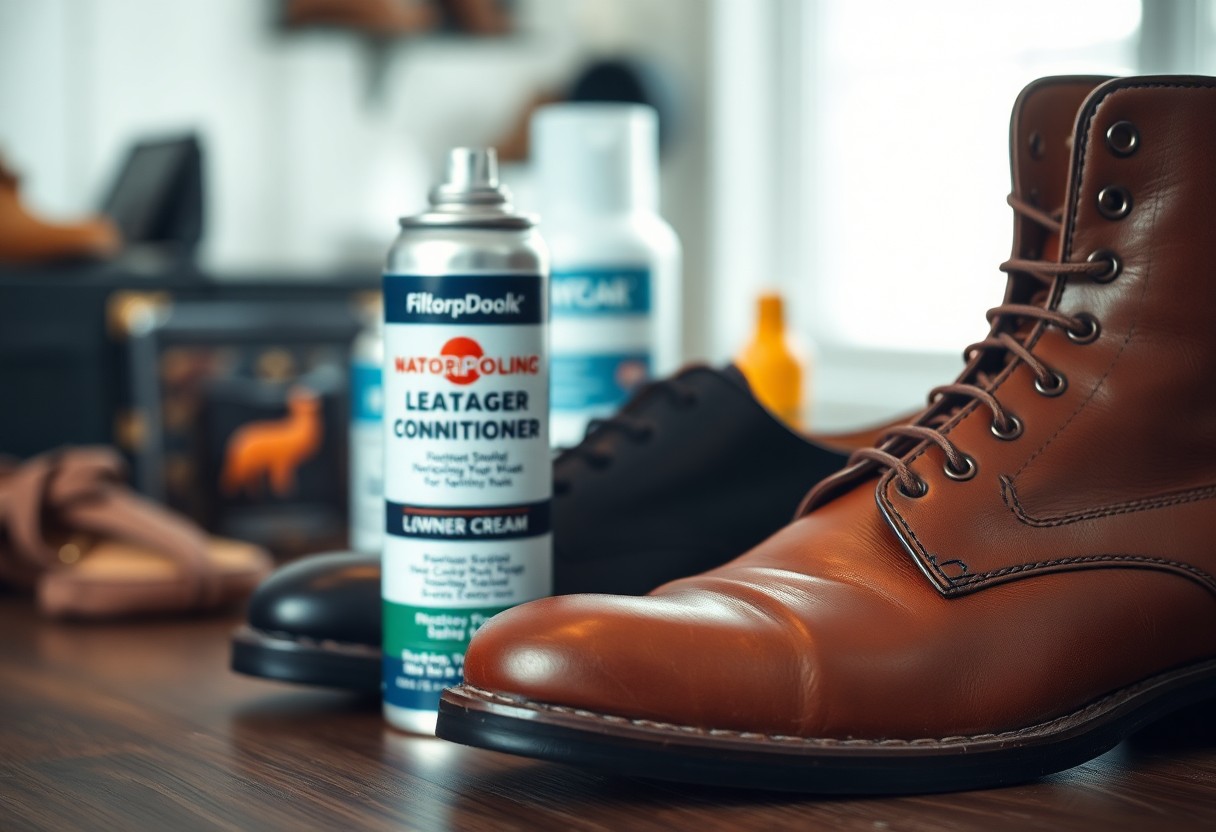
Exploring the Science Behind Proper Leather Care
A crucial element of effective leather care is understanding its molecular structure. The collagen fiber networks within your leather shoes require both protection and nourishment. When applying products to leather, they can interact with these fibers either by coating them or penetrating their depths. This interaction is vital for maintaining the long-term health of your leather footwear.
Understanding the Necessity of Nourishing Leather
It’s essential to recognize that your leather shoes need regular nourishment to preserve their quality. The natural oils within your leather shoes prevent cracking and maintain flexibility. Over time, these oils diminish due to regular wear and exposure to environmental factors. To maintain the leather’s structural integrity, it is crucial to replenish these oils through consistent conditioning.
Examining the Barrier Effects of Waterproofing Sprays
A significant drawback of waterproofing sprays is their tendency to create a barrier. When these sprays are applied to smooth leather, they form an impermeable layer that blocks both water and essential nutrients. This barrier prevents your leather care products from effectively penetrating the surface, resulting in a gradual decline in the leather’s quality over time.
The barrier effect of waterproofing sprays creates a problematic cycle for your shoes. While these sprays effectively block water, they simultaneously prevent the absorption of conditioning products that are vital for maintaining the leather’s health. Consequently, the leather may appear protected on the outside but is actually dehydrating and becoming brittle underneath. Silicone-based sprays are particularly damaging, creating a permanent barrier that is difficult to remove without harming the leather.
Adopting Effective Leather Protection Practices
Contrary to common beliefs, your smooth leather shoes require specific care methods that cater to the natural characteristics of full-grain leather. The best approach combines traditional techniques with products specifically designed to enhance the leather’s innate protective qualities, ensuring both immediate defense and lasting durability for your footwear.
Discovering the Advantages of Wax-based Solutions
A highly effective alternative to waterproofing sprays is premium wax-based products. These solutions work in harmony with your leather’s natural grain rather than against it. Applying wax polish creates a protective barrier that allows the leather to breathe, making it especially beneficial for toe caps and high-wear areas.
Maximizing Benefits from Cream and Conditioner Applications
Unlike conventional spray treatments, leather creams and conditioners provide essential nourishment while preserving the leather’s inherent protective properties. Your shoes benefit from oils that deeply penetrate the material, helping to prevent drying and cracking. Moreover, regular application of cream and conditioner creates a cumulative effect that enhances leather quality over time. The natural oils in these products promote the leather’s flexibility and strength while allowing it to develop a beautiful patina. It is recommended to apply these products every 4-6 wears to maintain optimal leather condition.
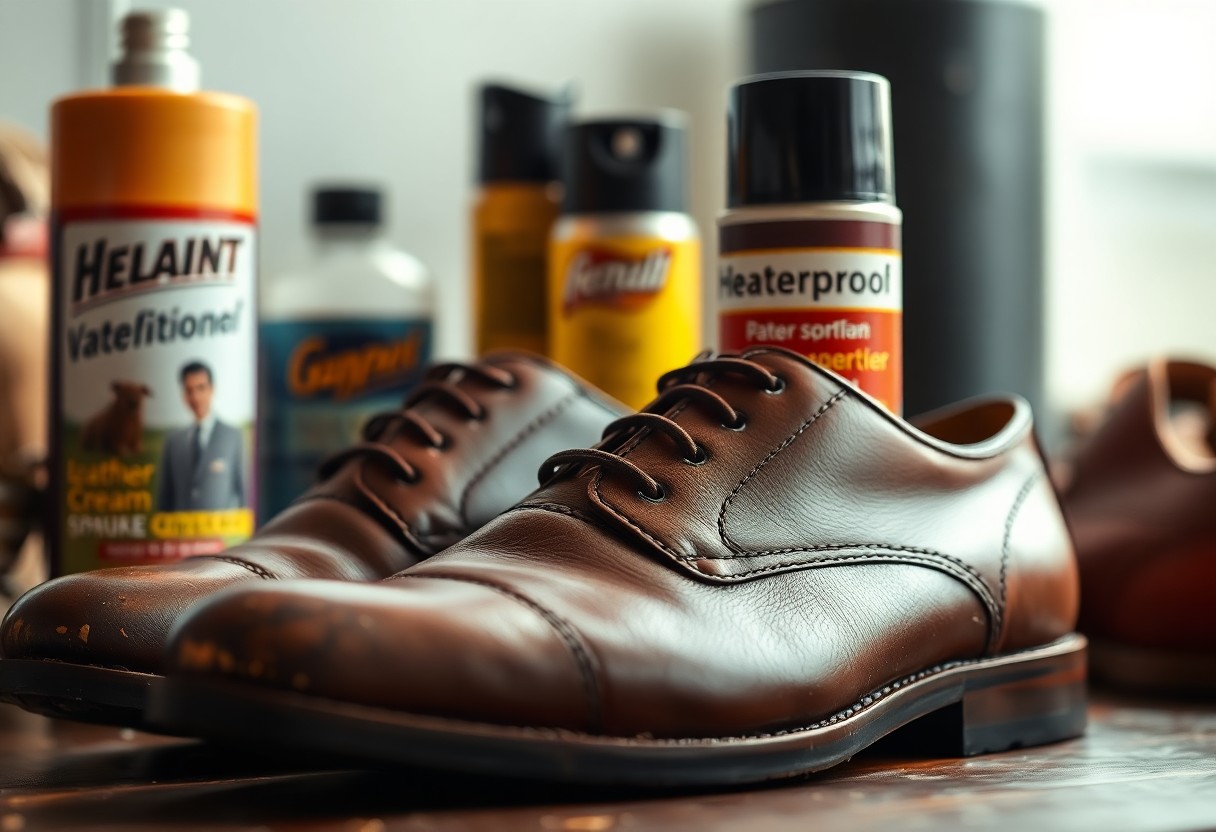
Identifying Appropriate Situations for Waterproofing Spray Utilization
Unlike smooth leather, certain materials greatly benefit from waterproofing sprays. These products create an effective water-resistant barrier on specific materials that lack inherent protection. Waterproofing sprays are particularly useful for suede, nubuck, and various textiles, where the material structure does not provide natural resistance to moisture.
Enhancing Suede and Nubuck with Waterproofing Spray
When you treat your suede or nubuck shoes with waterproofing spray, you significantly enhance their resistance to moisture damage. Many modern suede materials come pre-treated with factory waterproofing, but additional protection can help maintain this defense over time. The application of spray creates a protective barrier that effectively prevents water from penetrating these delicate materials.
Ensuring Comprehensive Protection for Textile Footwear
In addition to leather alternatives, textile footwear requires specialized protection against water damage. Materials such as canvas, mesh, and synthetic fabrics can achieve enhanced water resistance through proper spray application. Most textile materials are inherently absorbent, making them susceptible to water damage and staining.
Furthermore, waterproofing sprays for textiles contribute to preserving the shape and color of your shoes. The barrier they create also prevents dirt and debris from embedding in the fabric fibers. It is advisable to reapply the spray every 3-4 months for optimal protection, based on wear frequency and prevailing weather conditions.
Professional Insights on Effective Leather Care
Not all leather treatments are created equal. Leather care experts strongly advise against the use of waterproofing sprays on smooth leather. Full-grain leather shoes require specialized care that allows them to breathe and absorb nourishing treatments. Using inappropriate products can lead to leather damage that may cost hundreds of dollars.
Expert Opinions from Tannery Specialists
To maintain leather quality, tannery specialists emphasize that full-grain leather inherently possesses natural water-resistant properties in its outer layer. To preserve the leather’s protective qualities, it is essential to apply oils and waxes. Waterproofing sprays can block these necessary treatments from reaching the leather.
Insights from Professional Cobblers
For the long-term care of leather, professional cobblers recommend using wax-based products instead of waterproofing sprays. Your shoes will thrive from treatments that both protect and nourish the leather. Data shows that 90% of premature leather damage arises from the use of inappropriate care products.
By adhering to proper leather care techniques, your shoes can last an impressive 15-20 years instead of just 2-3 years with inadequate maintenance. Traditional wax treatments allow leather to retain its natural attributes while providing sufficient moisture protection. Your investment in high-quality leather footwear deserves meticulous care practices that preserve both aesthetic appeal and durability.
Key Recommendations for Optimal Leather Care
Your smooth leather shoes demand appropriate care that avoids waterproofing sprays. Instead, select shoe creams and waxes that nourish the leather while offering effective water protection. Full-grain leather comes with inherent protective qualities due to its grain layer, and waterproofing sprays can block essential oils from entering the leather, resulting in dryness and cracking. Reserve waterproofing sprays for suede, nubuck, or textile footwear where they can be effective. By choosing the right products, you can protect your leather shoes while ensuring their longevity.
Frequently Asked Questions about Leather Care
Q: Why is waterproofing spray harmful to smooth leather shoes?
A: Waterproofing spray forms a barrier on leather that prevents essential oils and conditioners from penetrating the material. While it provides water protection, it obstructs the necessary nourishment of the leather, which leads to drying and potential cracking over time, ultimately shortening the lifespan of the shoes.
Q: What alternatives should I consider instead of waterproofing spray on smooth leather shoes?
A: Consider a combination of shoe cream and wax polish. Shoe cream provides essential oils to nourish the leather, while wax polish forms a protective layer that helps repel water. This method complements the natural protective properties of full-grain leather, maintaining the leather’s health while offering effective water resistance.
Q: Which types of footwear can I safely apply waterproofing spray to?
A: Waterproofing spray is suitable for materials like suede, nubuck, and textiles. These materials lack the natural protection found in smooth leather and thus benefit from the protective barrier created by waterproofing sprays. Many modern suedes and nubucks may already have factory waterproofing treatments, but additional spray applications can enhance and maintain this level of protection.
The Article Why you shouldn’t use waterproofing spray on regular smooth leather and better alternatives appeared first on My Shoes Finder
The Article Waterproofing Spray on Smooth Leather: Risks and Alternatives Was Found On https://limitsofstrategy.com
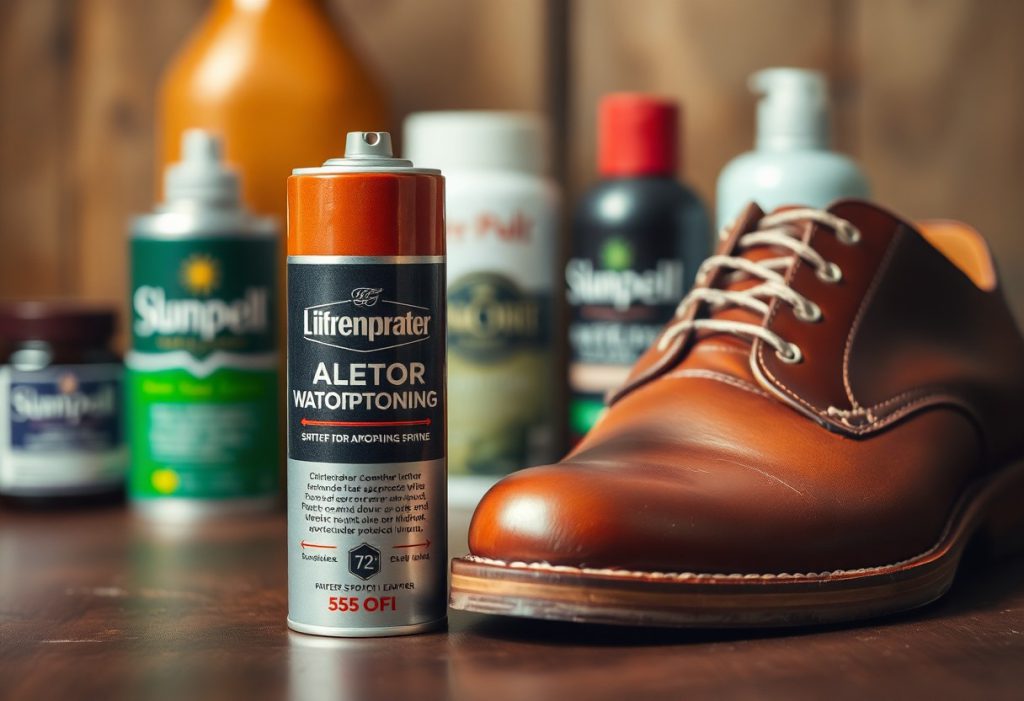
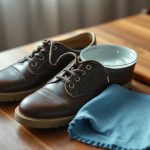

It’s so interesting to think about how our care routines can impact the longevity of leather goods! I’ve experienced the pitfalls of using sprays on my favorite smooth leather boots; they ended up looking dull instead of supple. Since I started using a high-quality leather conditioner and waxing regularly, I’ve seen a noticeable difference in how the leather holds up to wear. It’s almost like giving the shoes a little drink of water!
Your insights on leather care are spot-on, particularly the point about waterproofing sprays. I’ve encountered this issue myself when I assumed that a quick spray would protect my leather boots. Over time, I noticed they became drier and less supple, which was frustrating given the initial investment in them.
I’ve really enjoyed reading your insights on leather care—it’s a topic that often flies under the radar but can make a huge difference in the life of our favorite leather pieces. I totally relate to your point about waterproofing sprays. I used to rely on those sprays, thinking they were a quick fix for protecting my shoes from spills or rain. However, after a particularly disappointing experience where my once-luxurious leather boots began looking dull and cracked, I realized they’re actually more of a curse than a blessing for smooth leather.
You’ve hit on such a crucial point about waterproofing sprays and leather care. It’s easy to get drawn into the marketing hype, thinking a quick spritz can do the trick. Your experience with those once-luxurious boots is a classic example of how the shiny promise can lead to disappointment.